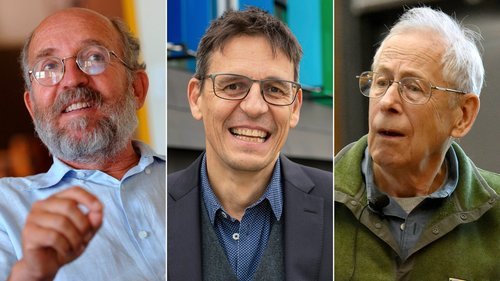Nobel Prize in Physics winners ‘forever changed our conceptions of the world’

The Nobel Prize in Physics has been jointly awarded to James Peebles, Michel Mayor and Didier Queloz for their work in furthering our understanding of the universe.
In a ceremony in Stockholm on Tuesday, one half of the prize was awarded to Peebles for “theoretical discoveries in physical cosmology,” and the other half to Mayor and Queloz for “the discovery of an exoplanet orbiting a solar-type star.”
“This year’s Nobel Prize in Physics rewards new understanding of the universe’s structure and history, and the first discovery of a planet orbiting a solar-type star outside our solar system,” tweeted the Nobel committee.
“The discoveries have forever changed our conceptions of the world.”
Half of the 9 million Swedish krona ($910,000) prize will be given to Peebles, while Mayor and Queloz will split the rest.
Peebles, who is Albert Einstein Professor of Science at Princeton University, had a message for budding scientists.
“My advice to young people entering science: you should do it for the love of science,” he said at a press conference following the announcement.
“You should enter science because you are fascinated by it.”
Over two decades Peebles developed a theoretical framework that forms the basis of our understanding of the history of the universe, according to the committee.
His models reveal that we only know about 5% of the content of our universe, with the remaining 95% consisting of unknown dark matter and dark energy, according to a press release.
“This is a mystery and a challenge to modern physics,” reads the release.
Mayor and Queloz focused their research on looking for unknown worlds in the Milky Way, and in 1995 discovered the first planet outside our solar system.
51 Pegasi b is a gaseous ball similar to Jupiter, according to the release, and its discovery “started a revolution in astronomy.”
Mayor is from Switzerland and teaches at the University of Geneva, while countryman Queloz teaches at the University of Geneva and the University of Cambridge.
Professor Martin Rees of the University of Cambridge hailed Peebles as “the most influential and respected leader of empirical cosmology with a sustained record of achievement spanning half a century.”
Rees added that Mayor and Queloz have “been among the leaders in the ongoing research that has led to the discovery of many thousands of other planetary systems, exhibiting an unexpected variety.”
In 2018 the Nobel Prize in Physics was awarded to a woman for the first time in 55 years, and for only the third time in its history.
Donna Strickland, a Canadian physicist, was awarded last year’s prize jointly with Gérard Mourou, from France, for their work on generating high-intensity, ultra-short optical pulses. They shared the award with an American, Arthur Ashkin, who at 96 becomes the oldest Nobel Laureate, for developing “optical tweezers.”
Both inventions had “revolutionized laser physics,” the Royal Swedish Academy said.


